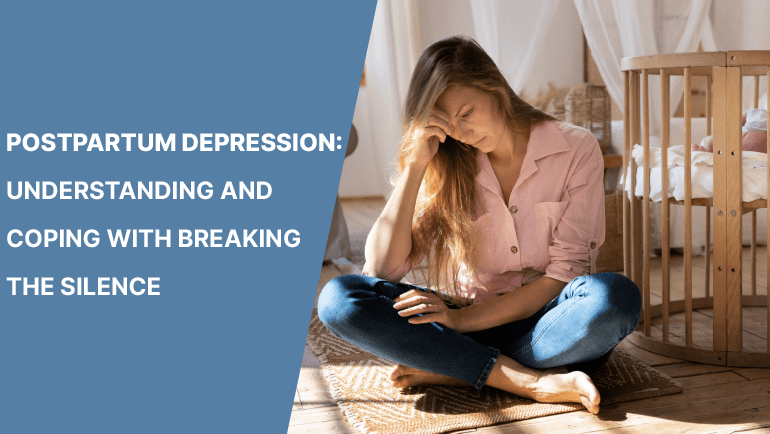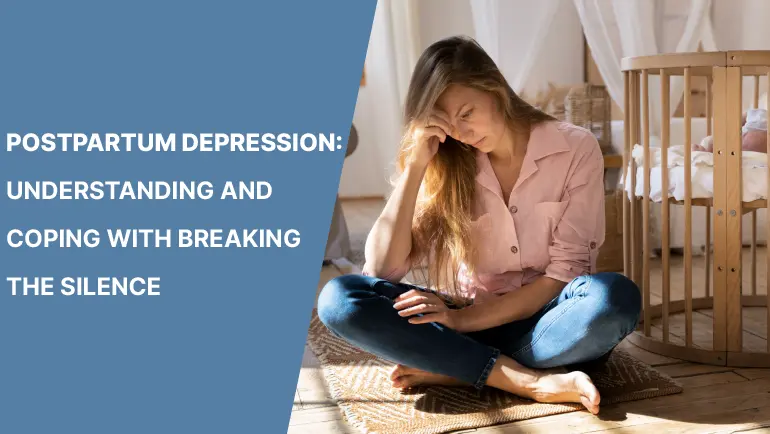
Introduction
Are you a new mom? Are you feeling sad constantly even though you feel you should be happy and excited? Many new mothers face ‘Postpartum Depression’ (PPD) after delivering their child. It’s quite an alienating feeling that only a mother going through postpartum depression can explain. As hard as this period can be, let me help you understand what you’re feeling, why you’re feeling that way, and what you can do to overcome these feelings.
“Postpartum is a quest back to yourself. Alone in your body again. You will never be the same, you are stronger than you were.” -Amethyst Joy [1]
What is Postpartum Depression?
The first time I heard of the term “postpartum depression” was in the interview given by Princess Diana in 1995. I was a kid back then, but somewhere, I could see her pain. Over the years, I closely tried to understand depression. This was one of the reasons why I took psychology, actually. When I found out that globally about 20% of women go through PPD, I truly understood what Princess Diana meant when she said, “You’d wake up in the morning feeling you didn’t want to get out of bed, you felt misunderstood, and just very, very low in yourself.”
DSM-V defines PPD as feelings of extreme anxiety, sadness, and exhaustion, post giving birth to a child. PPD can severely interfere with your connection with your newborn, and you might even have difficulty completing your tasks every day. You might be able to observe the symptoms of PPD within the first few weeks or months after delivery. If you don’t get the right treatment, you might take a year or more to recover [2].
Symptoms of Postpartum Depression
As I said that the real symptoms only a mother going through PPD can tell, but here’s what are the common symptoms, which can be seen during the last phases of your pregnancy or within the first four weeks of delivery [4] [5]:
- You might have felt sad for a long time and feel empty within.
- You might start crying for no particular reason.
- You may feel disinterested or not be able to enjoy activities that you liked earlier.
- You may feel exhausted and fatigued despite having rested enough.
- You might find it difficult to take care of your newborn or do any other tasks.
- Your sleep patterns might have changed- either you aren’t able to sleep, or you aren’t able to wake up.
- You might not like eating anything.
- You might be getting irritated and angry very quickly on the smallest of issues.
- You might over-worry about your child’s health and well-being.
- You might have racing thoughts and shortness of breath, apart from feeling restless and getting heart palpitations.
- You might even feel guilty, ashamed, and isolated.
- You might feel like your body is not your own. It’s like an out-of-body feeling.
Causes Of Postpartum Depression
There are a few causes of PPD that you can take into account while getting your diagnosis [3] [6]:
- Hormonal Changes: The dramatic drop in hormone levels after childbirth, particularly estrogen and progesterone, is believed to contribute to PPD. These hormonal fluctuations can affect neurotransmitter systems involved in mood regulation.
- Genetic Predisposition: Did you know that depression can travel from one generation to the other? That happens because the way we think can alter the DNA structure. So if any of your blood relatives had depression, it’s possible for you to have it as well.
- Psychological Factors: If, as a woman, you have already gone through depression or anxiety, then it’s possible for you to go through PPD. Plus, our life experiences have a lot to do with what happens to our mental, physical, and emotional health. So, if you are someone who has seen or been through abuse, trauma, neglect, the death of a close relative, etc., then depression, specifically PPD, symptoms can get triggered.
- Social Support: Most often, new mothers feel that they have to take care of a lot on their own- take care of themselves, the baby, the house, etc., all on their own. So, a lack of support from your friends, family, and partner can make you feel sad for a long time, triggering PPD.
- Life Stressors: Having a baby comes with a price. You might underestimate the costs. So, financial issues can trigger PPD. Other factors can be going through traumatic childbirth or having issues in your marriage. Plus, you might have this deep need to be a perfect mother to your baby, but that can trigger PPD as well.
Effects of Postpartum Depression
“Honestly, sometimes I still think I have to deal with [postpartum depression]. I think people need to talk about it more because it’s almost like the fourth trimester; it’s part of the pregnancy. I remember one day, I couldn’t find Olympia’s bottle, and I got so upset I started crying… because I wanted to be perfect for her.” -Serena Williams [7]
PPD impacts everyone around the mother, including herself [8]:
- Impact on Mothers: Because of PPD, you might not be able to take care of your baby. It might result in a decrease in your bonding with your baby. You may not be able to get your baby to breastfeed. PPD can impact your relationship with your partner, family, and even friends. This can deeply impact your overall quality of life.
- Impact on Infants: Your baby might not like your touch very much, and they may even be cranky during breastfeeding. They might show delays in crossing the stages of development. Over time, they may not be able to control or manage their emotions and face difficulty in talking to people.
- Family Dynamics: When you go through PPD and the people around you don’t quite understand what you’re feeling, your relationship with them can get impacted badly, just like in the case of Princess Diana. You might have frequent fights with your partner and family members, go days without talking to each other, and have no support from anyone.
- Long-Term Consequences: Once you have gone through PPD, you might get in again in your other pregnancies. In fact, PPD, too, can travel genetically from one generation to the next. In the long term, it can lead to heart issues and stomach issues.
How To Overcome Postpartum Depression?
It might seem like there is no going back or recovering from PPD. But with the right guidance and support, you can recover very quickly. Here’s what you can do [4] [9]:
- Seek Professional Help: One of the best things you will realize is that you don’t have to deal with everything on your own. If there are people who can help you, then take all the help you can get. You can begin by finding a perinatal mental health professional near you. They can give you the treatment options and the support you need.
- Psychotherapy: If you visit a psychologist, they may use Cognitive-behavioral therapy (CBT) to help you with your postpartum depression. Since this therapy helps you to identify and challenge your thoughts and beliefs, you can actually get rid of all your worries and fears in an effective way. Another form of psychotherapy you can use is Interpersonal therapy (IPD) which can help you build better relationships with people around you.
- Social Support: You need to have people around you. Just try getting out of the house to meet friends and family. If it’s difficult, you can invite them over or just connect on video calls with them. You can even join a support group where you can meet other mothers who were able to overcome it all. You will get so much strength from them that you will be able to help yourself better.
- Self-care: It might sound like a distant dream for you as a mother, but you need to start taking care of yourself. So, start prioritizing self-care. You can indulge in exercising, sleeping on time, eating healthy, taking out time for hobbies, etc. That way, you will be able to help yourself in your journey to recover from PPD.
- Involvement of Partner And Family: Your partner and family can be a huge support in your journey to recover from PPD. Just make sure they understand what PPD is and let them know in what ways you would like their help. That way, you would not have to worry about managing everything on your own, and you can recover faster.
- Medication (if necessary): You can even consult a psychiatrist. In severe cases, they can suggest some anti-depressant medicines to regulate your mood and manage the symptoms of PPD. But before you do that, just understand what precautions you need to take and if there are any risks involved.
Conclusion
Postpartum depression is a significant mental health concern that can harm mothers and their infants. With appropriate diagnosis and intervention, including therapy, medication, social support, and self-care, women experiencing PPD can find relief and regain their well-being. It is essential to raise awareness, promote early detection, and provide comprehensive support systems to address and overcome postpartum depression effectively.
If you are battling postpartum depression, connect with our expert counselors or explore more content at United We Care! At United We Care, a team of wellness and mental health experts will guide you with the best methods for your well-being.
References
[1] “10 Motherhood Quotes That We Absolutely Love — Bloome Wellness & Recovery,” Bloome Wellness & Recovery, May 12, 2021. https://www.momsinbloome.com/blog/motherhoodquotes
[2] G. P. de A. Moraes, L. Lorenzo, G. A. R. Pontes, M. C. Montenegro, and A. Cantilino, “Screening and diagnosing postpartum depression: when and how?,” Trends in Psychiatry and Psychotherapy, vol. 39, no. 1, pp. 54–61, Mar. 2017, doi: 10.1590/2237-6089-2016-0034.
[3] K. Cordes, I. Egmose, J. Smith-Nielsen, S. Køppe, and M. S. Væver, “Maternal touch in caregiving behavior of mothers with and without postpartum depression,” Infant Behavior and Development, vol. 49, pp. 182–191, Nov. 2017, doi: 10.1016/j.infbeh.2017.09.006.
[4] S. Davé, I. Petersen, L. Sherr, and I. Nazareth, “Incidence of Maternal and Paternal Depression in Primary Care,” Archives of Pediatrics & Adolescent Medicine, vol. 164, no. 11, Nov. 2010, doi: 10.1001/archpediatrics.2010.184.
[5] C. T. Beck, “Predictors of Postpartum Depression,” Nursing Research, vol. 50, no. 5, pp. 275–285, Sep. 2001, doi: 10.1097/00006199-200109000-00004.
[6] E. Robertson, S. Grace, T. Wallington, and D. E. Stewart, “Antenatal risk factors for postpartum depression: a synthesis of recent literature,” General Hospital Psychiatry, vol. 26, no. 4, pp. 289–295, Jul. 2004, doi: 10.1016/j.genhosppsych.2004.02.006.
[7] “Serena Williams on sisterhood, self-acceptance and staying strong,” Harper’s BAZAAR, May 30, 2018. https://www.harpersbazaar.com/uk/fashion/fashion-news/a20961002/serena-williams-july-issue-cover-shoot/











